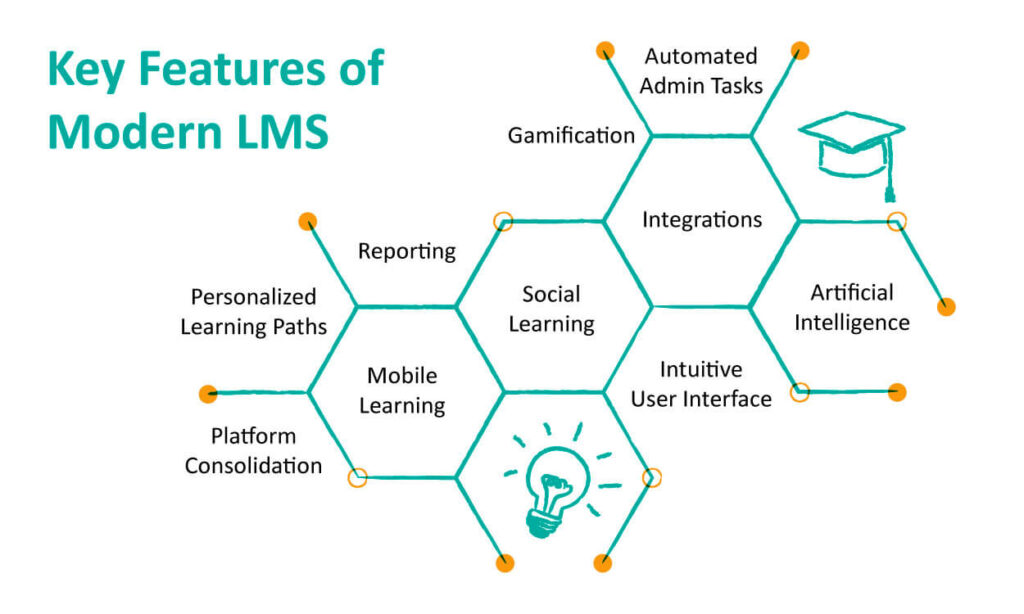Customize and Brand your Online Training Platform
In today’s competitive business landscape, organizations are constantly seeking innovative ways to enhance their employee training and development programs. One such approach that has gained significant traction is the adoption of a white label learning management system (LMS), a powerful tool that empowers businesses to create and deliver customized online training platforms that align with their unique branding and training needs.
Understanding White Label LMS: A Tailored Solution
A white label LMS is a cloud-based learning management system that allows organizations to customize the platform’s appearance, features, and functionality to match their specific branding and training requirements. Unlike traditional LMS solutions that come with a pre-defined look and feel, white label LMS platforms offer the flexibility to incorporate an organization’s logo, color scheme, and branding elements, creating a seamless and consistent user experience for learners.

Benefits of Leveraging a White Label LMS:
Adopting a white label LMS offers a multitude of benefits for organizations seeking to enhance their online training programs:
1. Enhanced Brand Identity: White label LMS platforms allow organizations to integrate their branding elements, creating a consistent and cohesive learning experience for their employees. This helps to reinforce brand recognition and foster a sense of belonging among learners.
2. Personalized Training Experiences: By customizing the LMS interface and content, organizations can tailor training programs to the specific needs and preferences of their learners. This personalized approach can lead to increased engagement, improved retention, and better learning outcomes.
3. Seamless Integration with Existing Systems: White label LMS solutions can be integrated with existing HR, payroll, and learning management systems, providing a centralized platform for managing training data and employee profiles. This integration streamlines administrative tasks and reduces the need for data duplication.
4. Enhanced Scalability: As an organization grows, its training needs evolve. White label LMS platforms are designed to scale alongside the organization, accommodating an increasing number of learners and expanding training requirements.
5. Cost-Effective Solution: White label LMS platforms can be a cost-effective alternative to developing a custom LMS from scratch. Organizations can leverage existing LMS infrastructure and avoid the upfront costs associated with custom development.

Customizing Your Online Training Platform: A Unique Learning Experience
Customizing a white label LMS empowers organizations to create a learning environment that aligns with their unique training goals and brand identity. Here are some key aspects to consider when customizing your LMS:
1. User Interface (UI) and User Experience (UX): Design an intuitive and user-friendly interface that facilitates easy navigation and enhances the overall learning experience.
2. Content Delivery and Presentation: Tailor content delivery methods and presentation formats to match the learning styles and preferences of your target audience.
3. Branding Integration: Seamlessly incorporate your organization’s branding elements, including logo, color scheme, and messaging, to create a cohesive learning environment.
4. Gamification and Engagement: Incorporate gamification elements, such as points, badges, and leaderboards, to motivate learners and encourage active participation.

Branding Your Online Training Platform: Making it Your Own
Branding your online training platform is crucial for establishing a strong brand identity and reinforcing your organization’s values. Here are some effective branding strategies:
1. Consistent Branding Elements: Use your organization’s logo, color scheme, and typography consistently throughout the LMS platform.
2. Brand Voice and Messaging: Infuse your brand’s voice and messaging into the LMS content, ensuring consistency with your overall brand communication.
3. Visual Appeal: Utilize high-quality images, graphics, and videos that align with your brand’s aesthetic and appeal to your target audience.
4. Branded Communication: Use branded emails, notifications, and certificates to reinforce your brand identity and maintain consistency across all touchpoints.

Features to Consider When Choosing a White Label LMS:
The choice of a white label LMS should be based on careful consideration of your organization’s specific needs and training requirements. Here are some key features to evaluate:
1. Customization Options: Assess the platform’s ability to accommodate your branding and customization requirements.
2. Content Management Tools: Evaluate the ease of creating, managing, and delivering training content using the LMS’s tools.
3. Learning Management Features: Assess the platform’s ability to track learner progress, manage assessments, and provide detailed reports.
4. Integration Capabilities: Evaluate the LMS’s ability to integrate with existing systems, such as HR, payroll, and learning management platforms.
5. Scalability and Flexibility: Ensure the platform can accommodate future growth in the number of learners and training content.
6. Support and Maintenance: Assess the level of support and maintenance provided by the LMS vendor.

Integrating Existing Content into a White Label LMS:
A white label LMS should seamlessly integrate with your existing training content, ensuring a smooth transition and avoiding the need to recreate materials. Here are some strategies for effective content integration:
1. Content Format Conversion: Ensure the LMS supports the conversion and presentation of existing content formats, such as SCORM, AICC, and xAPI.
2. Content Migration Tools: Utilize the LMS’s content migration tools to import existing content efficiently and accurately.
3. Content Organization and Categorization: Organize and categorize existing content to make it easily discoverable and accessible to learners.
4. Content Curation and Review: Review existing content for relevance, accuracy, and alignment with current training objectives.

Training and Support for Using a White Label LMS:
Effective training and support are crucial for ensuring that both administrators and learners can fully utilize the white label LMS. Here are some key considerations:
1. Comprehensive Documentation: Provide comprehensive user guides, tutorials, and FAQs to help users navigate the LMS and its features.
2. Online Training Modules: Develop online training modules that walk users through the LMS’s functionalities and provide hands-on practice.
3. Dedicated Support Team: Establish a dedicated support team to address user queries, troubleshoot issues, and provide ongoing guidance.
4. Onboarding and Training Sessions: Offer onboarding sessions and training sessions to familiarize users with the LMS and its features.

Pricing and Scalability of White Label LMS:
Pricing models for white label LMS platforms vary depending on the vendor, features, and user volume. Here are some key considerations when evaluating pricing:
1. Subscription-Based Pricing: Many white label LMS platforms offer subscription-based pricing models, where organizations pay a monthly or annual fee for access to the platform and its features.
2. Per-User Pricing: Some vendors may charge based on the number of active users, allowing organizations to scale their costs as the number of learners grows.
3. Custom Pricing: For larger organizations or those with complex training requirements, custom pricing plans may be available to accommodate specific needs.

Scalability and Future Growth:
As organizations grow and training needs evolve, the chosen white label LMS should be able to scale seamlessly to accommodate future requirements. Here are some factors to consider:
1. User Capacity: Ensure the LMS can support a growing number of learners without compromising performance or functionality.
2. Content Storage: Assess the LMS’s ability to accommodate increasing volumes of training content and multimedia resources.
3. Feature Upgrades: Evaluate the vendor’s willingness to provide feature upgrades and ongoing enhancements to the LMS platform.

Case Studies – Successful Implementation of White Label LMS:
Numerous organizations have successfully implemented white label LMS platforms to enhance their online training programs. Here are a few examples:
1. Green LMS: Green LMS utilized a white label LMS to create a centralized platform for delivering training content to its global workforce. The Cloud LMS platform enabled Green LMS to standardize training delivery, enhance brand consistency, and track learner progress effectively.
2. SAP: SAP adopted a white label LMS to provide its customers with a branded and personalized learning experience. The LMS allowed SAP to tailor training content to specific customer needs and industries, improving customer satisfaction and loyalty.
3. Microsoft: Microsoft leveraged a white label LMS to create a partner training portal, providing partners with access to self-paced training modules and certifications. The LMS helped Microsoft to streamline partner onboarding, improve partner skills, and enhance their ability to sell Microsoft products.
Conclusion: Unleashing the Power of Customization and Branding
White label LMS platforms offer a powerful solution for organizations seeking to customize and brand their online training programs. By leveraging the flexibility and customization capabilities of white label LMS, organizations can create training environments that align with their unique branding, training needs, and target audience. As the demand for personalized and engaging training continues to grow, white label LMS platforms are poised to play an increasingly crucial role in enhancing employee development and organizational success.
With Green LMS, you can:
- Create and deliver engaging, personalized, and effective online learning experiences
- Streamline administrative tasks and reduce costs
- Facilitate seamless communication and collaboration
- Empower educators with data-driven insights
- Foster a lifelong love of learning
Join the revolution towards inclusive, accessible, and effective education for all.
Sign up for your free LMS today and discover how Green LMS can transform your educational institution.
Click here for Free Demo Green LMS.
Unleash the transformative power of white label LMS and revolutionize the way you train and learn. Embrace the future of education with Green LMS. Find more details about LMS for Corporate, LMS for SME, LMS for Schools. LMS for University & College.


